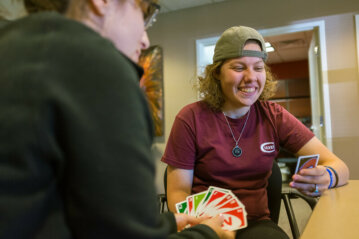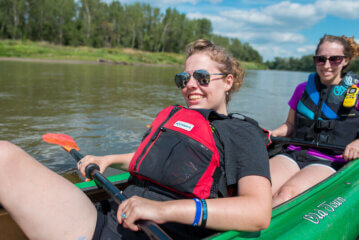Dave and Kay Johnson endured enormous tragedy in late 2015. Their then-19-year-old daughter, Melissa, suffered a near-fatal traumatic brain injury after her truck collided with a tree. Dave and Kay faced tremendous hardship and uncertainty as Melissa took her first steps toward recovery but watched as she embarked on a relentless mission back to life at QLI. We caught up with the Johnson family to get their unique and inspiring perspective on rehabilitation journey.
What did the doctors tell you about the severity of Melissa’s injury?
K: We were looking at a very grim future.
D: I’ve been a trauma nurse since 1985. I did not know what Melissa had sustained was survivable because I’d simply not seen someone survive what she’d survived. When we met with a neurologist, he told us Melissa had a ten-percent chance of surviving the night. If she did survive, there was only a one-in-ten chance of her ever waking up again.
K: And even if she did wake up, there was a very small chance she’d be able to indicate her wants and needs at any point.
What was her path? How long was she out?
K: She was in a coma for three weeks. After three weeks, she opened her eyes, but you could tell there was nothing there. When she left the hospital for rehabilitation in Chicago, she was barely following any commands.
D: At that point, we really didn’t have the hope that she would make a better recovery. She appeared to be in a lot of pain.
K: She would try to whisper. One of the first words she wrote on a whiteboard was “frustrated.” She was at Shirley Ryan Ability Lab in Chicago until around April 5th, when the doctors told us they wanted to send her to QLI in Omaha.
What was her condition when she arrived at QLI?
D: When she came to QLI, she could not speak. She could not eat. She could not walk. She needed restraints to prevent sliding out of her wheelchair. Her short-term memory was non-existent.
What were the specific ways you saw her progress?
K: I remember the first time I went out to visit her, she needed so much help just to keep from sliding out of a wheelchair. The second time I visited, not only did she not need that help, but she was pushing the wheelchair herself with her feet. Her voice had become very strong.

K: Think about that. From April to July. Going from slipping out of her wheelchair, not being able to talk. And in July, she’s walking on her own, she’s kayaking, rock climbing. She’s enjoying her dog, introducing him to other people.
What does that feel like for you as the parents?
D: We have tried so much to get into the “new normal,” but there is no “new” normal because things are always changing. Things keep changing all the time. Still improving.
K: It’s incredible because we know people Melissa’s age who’ve had similar injuries, but they haven’t had the opportunity for rehab like Melissa has. Nothing like QLI.
D: QLI should become the model for the way brain injury treatment should be done. Not just the model—it should be the whole paradigm. Once you see how it’s done at QLI, it doesn’t make sense to do it any other way. A lot of providers only provide what is necessary, what is medically covered. They don’t provide the whole immersive experience and don’t see how valuable that is.
What is life like now?
D: You know, it’s hard for us to let go. We’re still protective. Melissa will sometimes say, “Mom, Dad, I’ve got this.” She has to cue us to back away.
K: She’s 21 now and wants to be treated like a 21-year-old. She knows we’re here if she needs help. The old restaurant she worked at in high school kept her job and about three months after she came home she went back to work there as a hostess for a few hours a week.
D: Last week, she started college again. She’s taking English composition. She works as an assistant teacher at our church. And with me in the car, she’s driving. She’s still doing some vision therapy. College is essentially her continuing cognitive therapy.
I’ve been doing my job for a long time, like I said, taking care of trauma patients since 1985. I’ve always tried to find the person inside the patient, and I think that’s exactly what QLI does organizationally. That’s what I attribute a lot of her recovery to. They didn’t return us a patient. They returned to us the person that we love.
Categories: Adaptive Sports, Brain Injury, QLI Magazine

